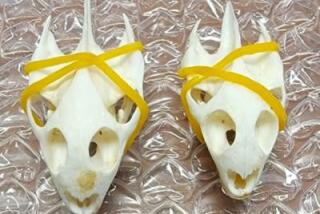Taiwan Pressed to Halt Trade in Rhino Horns, Tiger Bones
- Share via
TAIPEI, Taiwan — The haul from the day’s raids on six pharmacies was meager: a snake, some slices of rhino skin and genitals from deer.
No rhino horns, no tiger bones.
But Taiwan’s campaign to wipe out the trade relies as much on perception, Tseng Ku-feng says, and his squad’s raids served their message: Using exotic animals as medicine can be risky business.
In Taiwan, where Western and traditional Chinese medicine coexist, that message has become increasingly important. The country faces sanctions unless it abolishes the trade of rhino horns and tiger bones by November.
Taiwan is also campaigning for readmission to the United Nations, so the last thing it needs is to be branded an international outlaw. As a result, it is anxious to demonstrate that it is cracking down.
The problem is that rare animal parts are prized for their curative powers. “Taiwanese believe that if a part of you is ill, you eat that part of an animal to strengthen it, and if it is from a rare species, so much the better,” said Tseng, who led the raids by the Taipei City Joint Wildlife Protection Squad.
“Any rhino horns or tiger bones for sale?” he asked at the counter of a medicine shop lined with white porcelain urns of herbal medicines.
No, replied the shopkeeper.
Then the seven-member squad, including two policemen and a zoo specialist, began a search. Light brown slivers were confiscated from a drawer labeled “genuine rhino skin.”
Shopkeeper Lai Su-chueh insisted that the stuff was imported many years ago to help heal cuts and bruises.
A block away, a shop displayed wall plaques offering bear gall bladders and monkey kidney stones.
These ease swellings, coughing and other ailments, explained the shopkeeper. Tseng told him to remove the plaques.
“They may not be endangered species, but we should discourage entirely the use of animal parts as medicine,” he said.
At a third shop, deer genitals and a snake were seized for examination.
Tseng, a botanist, says corrupt police often tip off shopkeepers about raids.
Only 10,000 rhinos live in the wild, down 90% over 20 years, according to U.S. government estimates.
The 120-nation U.N. Convention on International Trade in Endangered Species decided Sept. 7 to impose some economic sanctions on China and Taiwan unless they wiped out the trade by November.
The sanctions could cost Taiwan more than $20 million a year in exports.
Alarmed, the government set up a task force of police, customs and educators, promised to increase the penalty for trafficking from one year in prison to seven, and offered rewards of $3,700 for information on horn hoards.
Meanwhile, China says it has decided to stop producing some traditional Chinese medicines that include tiger bones and rhino horn. From the end of November, sale of such medicines will be banned, and researchers will look for substitutes, according to Xinhua, the official news agency.
Recently a princess from the Himalayan kingdom of Bhutan was arrested at Taipei airport, suspected of smuggling in 22 rhino horns, police said. The 33-pound haul was Taiwan’s largest, they said. Newspapers estimated its value at $1 million.
The conservationists’ campaign is showing signs of igniting a nationalist backlash. Dozens of members of the island’s Patriotic Assn. recently marched on the office of the Green Consumers Foundation, an environmental group that has helped investigate the trade in Taiwan and China.
The Patriotic Assn. accused it of collaborating with outsiders to tarnish Taiwan’s image.
More to Read
Sign up for Essential California
The most important California stories and recommendations in your inbox every morning.
You may occasionally receive promotional content from the Los Angeles Times.













